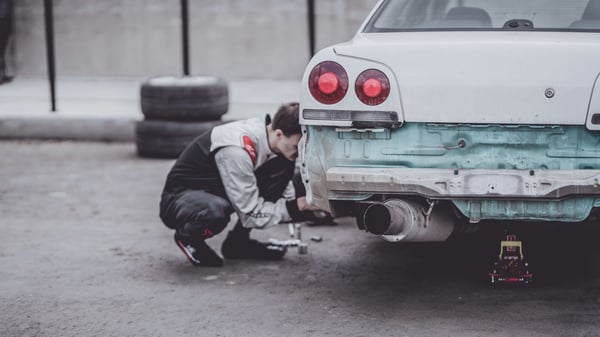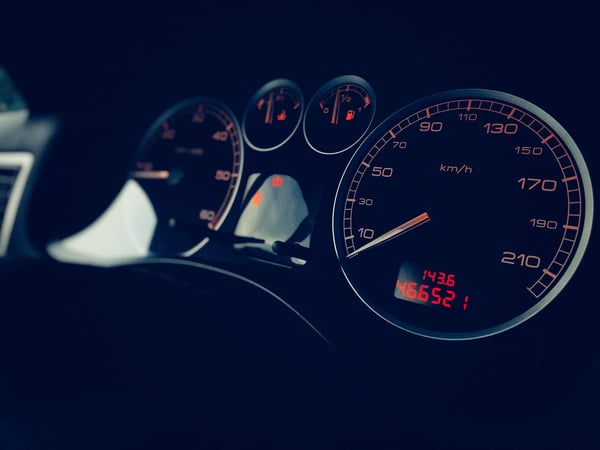January 28, 2025
February 17, 2025
Are you looking to buy a new or used car? In this article I will be writing about how to check the real KM on a car, that is to say the actual distance a car has done during its lifetime. Knowing how many kilometres a car has been driven in its lifetime is of course important. This is an indicator of how much wear and tear the car has experienced, and therefore how likely is to need parts replaced, and ultimately will give you an idea of how long the car might last you.

Nowadays it is not uncommon to see cars with hundreds of thousands of KM on the clock. My first car had well over 250,000 kilometres on the clock when I finally sent it to the scrapyard. However, using the kilo meterage to assess whether to buy a car is still a valid method.
We have all heard stories of cars having their odometers (yes – that’s the correct name for a kilometre or mile counter) rolled back or ‘clocked’ in the past, but odometer fraud is actually on the rise. Whereas on older style cars mechanics would roll back the dial displaying the numbers or actually change the whole display for one from another scrapped car that had done less kilometres, now the digital displays make it even easier to manipulate the kilo meterage.
But how can you tell that the odometer on your current car, or a car you are considering buying has not been tampered with? Here is how to check the real km on a car so you do not get caught out:
Look out for scams
Well, the basics are the best, as always. If it looks too good to be true it probably is. Here's a few things to take into account when buying a used car in Spain.
Calculate the yearly mileage
Work out what the value showing on the odometer would represent per year. Insurance companies put an approximate figure of 12,000 – 20,000 kilometres per year as an average.
Look for signs of wear and tear
Look for signs on the car. Does the steering wheel or the brake pedal have signs of wear? Those would not wear just by sitting in the same place, no matter for how long. Does that correlate with what the odometer says?

Check the vehicle documents
Consult the documentation for the vehicle. The ITV (Technical Inspection of Vehicles) needs to take place every 2 years on cars over 4 years old and under 10 years old and every year thereafter. That means every couple of years at least there is an official external record of the kilo meterage. An owner, and therefore seller, must have this ITV documentation for the car to be road legal. Discover vehicle documentation requirements in Spain.
Consult the log book
If you have the log book of the car the odometer reading should be recorded there. Look for discrepancies. If you think this has been tampered with, looks suspicious in anyway, or is missing contact the DGT to check the records with them.
Incidentally, this paperwork can also tell you any issues the car had that led to it failing any ITV tests in the past and could give you some clues about possible recurring or future mechanical problems to look out for.
Get digital
Most cars have an on-board computer nowadays, and a mechanic could easily plug a device into the car’s computer and be able to tell you exactly how many miles a car has done in its entire lifetime, independently of what the odometer shows.
Ironically one of the tools used to check this is the same as that used to actually change the odometer in the first place. There is actually a genuine reason for doing this, as some meters can become out of sync and need corrected periodically. You can buy a device that would do this online easily and relatively cheaply, so you can see why the practice of rolling back the odometer is rife, even when buying from individuals.

Changing the reading on a vehicle's odometer is of course illegal, potentially resulting in a threat to safety, and definitely in the expected performance of the car and its components. If you find a vehicle has been tampered with you have the right to return the vehicle, get your money back and report the seller.
Knowing how to check the real KM on a car is potentially an operation that could save you thousands. Ask for help from a trustworthy mechanic and the DGT. It is probably quicker and easier than doing it yourself.
|
If you are searching for car insurance in Spain, Caser Expat Insurance has the right policy for you! |
Frequently Asked Questions
To verify the actual mileage of a used car in Spain, you can request the DGT (Dirección General de Tráfico) vehicle history report, which includes recorded mileage from past ITV (Inspección Técnica de Vehículos) inspections. Additionally, checking the car’s service records, invoices from previous repairs, and reviewing wear and tear on components like the pedals, steering wheel, and seats can help confirm if the mileage is consistent with the car’s age and condition.
Common signs of odometer tampering include inconsistent wear and tear on the car’s interior (such as a worn-out steering wheel, pedals, or seat fabric), misaligned or loose odometer numbers, and a lack of service history that matches the displayed mileage. Another red flag is when a vehicle’s mileage appears unusually low compared to its age or the average annual mileage for similar cars.
Yes, in Spain, you can request a vehicle history report from the DGT (Informe de Vehículo de la Dirección General de Tráfico), which includes recorded mileage from previous ITV inspections. Additionally, some private companies and online platforms offer vehicle history reports that may include mileage records, previous owners, and accident history
Vehicle history reports from official sources like the DGT and ITV records are generally reliable for confirming true mileage, as they are based on official inspections. However, private vehicle history reports may vary in accuracy, depending on the sources they use. If there are any doubts about a car’s mileage, a mechanic’s inspection and checking maintenance records can provide additional verification.
.png?width=344&height=67&name=logo_caser%20(2).png)








Let Us Know What You Thought about this Post.
Put your Comment Below.